 There are few pleasures for me greater than seeing a familiar performer break from type as they essay a role. Of course, when we think of type and acting, we often think in terms of typecasting and stock characters -- when a certain performer becomes so associated with a familiar kinds of role that they get "stuck." For supporting actresses, this can be both a blessing and a curse (just think of Thelma Ritter, crafting vastly different characterizations yet somehow confined to delivering variations on a theme). But there's another sort of "type" that's harder to break, when a performer elicits such a specific feeling in both performance and persona that it's almost more delicious when they play against that grain. (This is, to my mind, what Glenn Close did when she broke out of her Supporting Actress mold of generous supermothers to her Best Actress nominations for those monstrous gorgons. Perhaps another example? Just imagine Dolly Parton as a deglammed villain...) Yes, there's something thrilling when a familiar performer breaks from type in that way. Like when one of the most forceful, articulate and strident activist presences in contemporary cinema takes on the role of a sweet, duty-bound and deferential wife and mother. As stunt casting, it can be shocking and thrilling but, when the performance is really good to boot, something marvelous can happen, as it does with...
There are few pleasures for me greater than seeing a familiar performer break from type as they essay a role. Of course, when we think of type and acting, we often think in terms of typecasting and stock characters -- when a certain performer becomes so associated with a familiar kinds of role that they get "stuck." For supporting actresses, this can be both a blessing and a curse (just think of Thelma Ritter, crafting vastly different characterizations yet somehow confined to delivering variations on a theme). But there's another sort of "type" that's harder to break, when a performer elicits such a specific feeling in both performance and persona that it's almost more delicious when they play against that grain. (This is, to my mind, what Glenn Close did when she broke out of her Supporting Actress mold of generous supermothers to her Best Actress nominations for those monstrous gorgons. Perhaps another example? Just imagine Dolly Parton as a deglammed villain...) Yes, there's something thrilling when a familiar performer breaks from type in that way. Like when one of the most forceful, articulate and strident activist presences in contemporary cinema takes on the role of a sweet, duty-bound and deferential wife and mother. As stunt casting, it can be shocking and thrilling but, when the performance is really good to boot, something marvelous can happen, as it does with...

...Vanessa Redgrave in Howards End (1992)
approximately 17 minutes and 27 seconds
13 scenes
roughly 12% of film's total running time
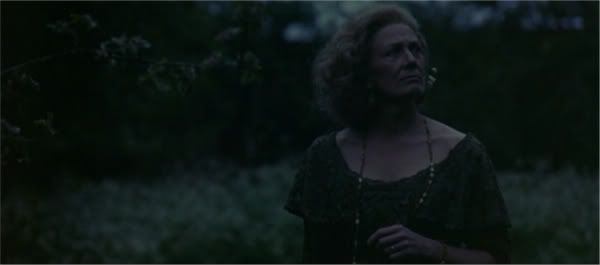 Yet, Redgrave's Ruth holds one thing dearer than all else: her familial home of Howards End.
Yet, Redgrave's Ruth holds one thing dearer than all else: her familial home of Howards End.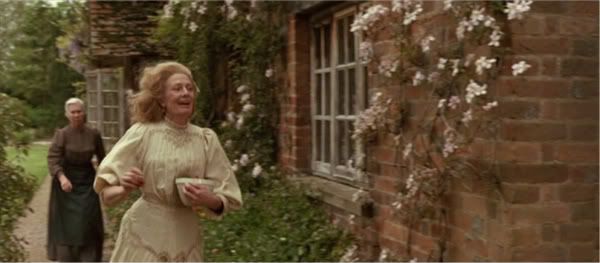 In quick flashes, we see how the way of living at Howards End elicits the young woman who yet lives inside the aging matron.
In quick flashes, we see how the way of living at Howards End elicits the young woman who yet lives inside the aging matron.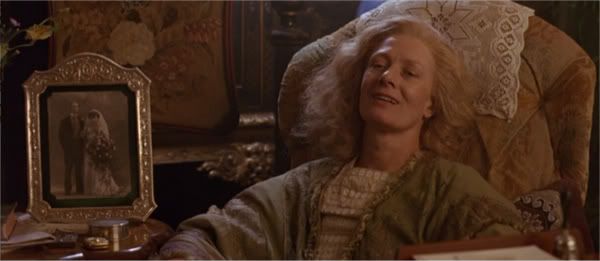 But Redgrave's Ruth is no longer young. A barely acknowledged, mysterious illness has caused Ruth to reckon her own mortality and Redgrave's Ruth finds herself unexpectedly "brooding" about a rapidly transforming Britain and what future it might hold for her beloved Howards End.
But Redgrave's Ruth is no longer young. A barely acknowledged, mysterious illness has caused Ruth to reckon her own mortality and Redgrave's Ruth finds herself unexpectedly "brooding" about a rapidly transforming Britain and what future it might hold for her beloved Howards End.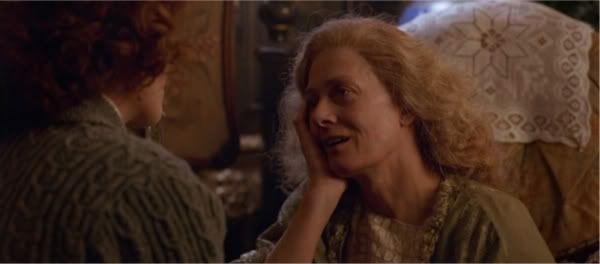 At this moment, Redgrave's Ruth encounters Meg Schlegel, an unmarried woman of not dissimilar social standing but of much diminished economic security (Emma Thompson giving an utterly winning portrait of a complex character).
At this moment, Redgrave's Ruth encounters Meg Schlegel, an unmarried woman of not dissimilar social standing but of much diminished economic security (Emma Thompson giving an utterly winning portrait of a complex character).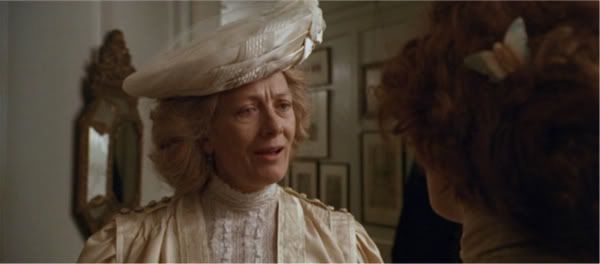 Meg's chattiness and generosity of spirit prove a refreshing diversion for Ruth, and the bluestocking Meg and the blue-blooded Ruth soon become unlikely but devoted friends.
Meg's chattiness and generosity of spirit prove a refreshing diversion for Ruth, and the bluestocking Meg and the blue-blooded Ruth soon become unlikely but devoted friends.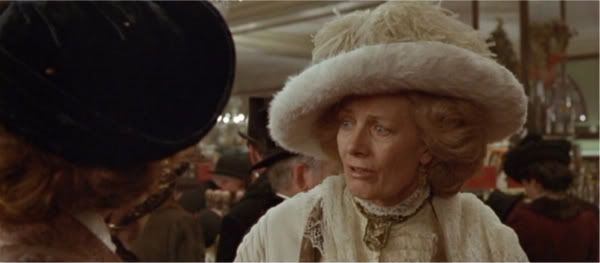 In friendship with Meg, Redgrave's Ruth blossoms -- expressing opinions, discovering a kind of assertiveness, trusting the validity of her private hopes -- and Redgrave's Ruth is grateful for Meg's witness of this self-discovery.
In friendship with Meg, Redgrave's Ruth blossoms -- expressing opinions, discovering a kind of assertiveness, trusting the validity of her private hopes -- and Redgrave's Ruth is grateful for Meg's witness of this self-discovery.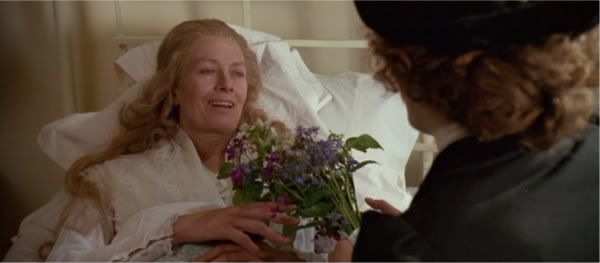 Ruth's sincere gratitude to Meg finds its expression in Ruth's final gesture, an assertive act of incredible generosity which her family must dismiss as fraudulent and uncharacteristic of the Ruth Wilcox (they thought) they knew. This misunderstanding of Ruth's last wish impels the action and drama of the narrative that unfolds within Howards End and Ruth's presence haunts the action of the film as complication upon complication delays the fulfillment of Ruth's plans. For this narrative to work (and thanks to Ruth Prawer Jhambvala's screenplay it does), Ruth Wilcox must be both a vulnerably human figure at the same time that she's ghostly, ethereal, almost supernatural.
Ruth's sincere gratitude to Meg finds its expression in Ruth's final gesture, an assertive act of incredible generosity which her family must dismiss as fraudulent and uncharacteristic of the Ruth Wilcox (they thought) they knew. This misunderstanding of Ruth's last wish impels the action and drama of the narrative that unfolds within Howards End and Ruth's presence haunts the action of the film as complication upon complication delays the fulfillment of Ruth's plans. For this narrative to work (and thanks to Ruth Prawer Jhambvala's screenplay it does), Ruth Wilcox must be both a vulnerably human figure at the same time that she's ghostly, ethereal, almost supernatural. In a masterful bit of actressing, Vanessa Redgrave strikes a sublime balance in her characterization of Ruth Wilcox. Here, Vanessa Redgrave crafts a lovely portrait of a loving, deferential woman basically untroubled by the social norms that so confine her. Perhaps most impressive is just how deftly Redgrave tempers her own formidable and electrifying force of personality and channels it into a vivid depiction of Ruth's intrinsic integrity. Redgrave's Ruth emerges as a really nice lady who's about to die and who only wants to be sure of one thing before she goes. And Redgrave makes a smart, masterful choice to convey Ruth's reality: simple complexity. At nearly every moment, Redgrave's Ruth embodies an elemental paradox -- she's both young and old, or ill and vital, or shy and assertive, or selfish and selfless -- and, through it all, Redgrave conveys Ruth's human complexity with a transcendent, humane simplicity.
In a masterful bit of actressing, Vanessa Redgrave strikes a sublime balance in her characterization of Ruth Wilcox. Here, Vanessa Redgrave crafts a lovely portrait of a loving, deferential woman basically untroubled by the social norms that so confine her. Perhaps most impressive is just how deftly Redgrave tempers her own formidable and electrifying force of personality and channels it into a vivid depiction of Ruth's intrinsic integrity. Redgrave's Ruth emerges as a really nice lady who's about to die and who only wants to be sure of one thing before she goes. And Redgrave makes a smart, masterful choice to convey Ruth's reality: simple complexity. At nearly every moment, Redgrave's Ruth embodies an elemental paradox -- she's both young and old, or ill and vital, or shy and assertive, or selfish and selfless -- and, through it all, Redgrave conveys Ruth's human complexity with a transcendent, humane simplicity.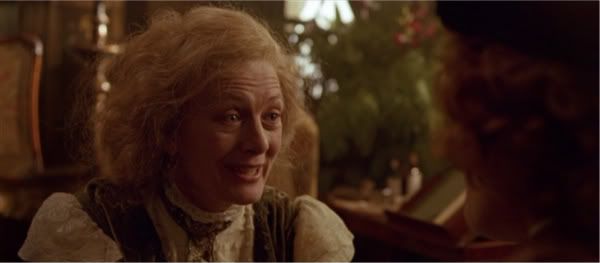 Through Redgrave's forceful simplicity, we may not learn much about Ruth Wilcox but we emerge, along with Thompson's Meg, certain that Ruth Wilcox is a formidable spirit not to be taken for granted, nor to be dismissed easily. And it's that spirit that becomes the clarifying filter guides us through the rest of the emotionally intricate story. In short, Redgrave performance is stunningly crafted work, that of an artisan and an artist. (A fact made all the more impressive by the circumstances surrounding the filming of her scenes.)
Through Redgrave's forceful simplicity, we may not learn much about Ruth Wilcox but we emerge, along with Thompson's Meg, certain that Ruth Wilcox is a formidable spirit not to be taken for granted, nor to be dismissed easily. And it's that spirit that becomes the clarifying filter guides us through the rest of the emotionally intricate story. In short, Redgrave performance is stunningly crafted work, that of an artisan and an artist. (A fact made all the more impressive by the circumstances surrounding the filming of her scenes.)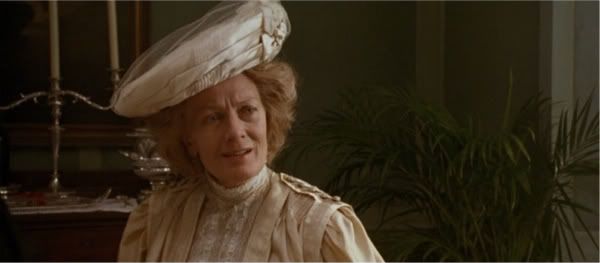 Utterly ethereal yet utterly real. A stunning, masterful bit of actressing.
Utterly ethereal yet utterly real. A stunning, masterful bit of actressing.

3 comments:
it's one of my favorite Vanessa Redgrave performances, next to Isadora. I think it's even betten than Julia (wasn't that the easiest Oscar win ever? :D we should do '77).
as much as I love it, it's not a performance that everyone could appreciate. I think it takes a certain amount of love and dedication to the cause of actressing. I know people who would immediately neglect it because the story is so complex that such a short performance could just get lost by the end of the film.
didn't you find Anthony Hopkins's performance to be rather... out of place? wrong casting, I think.
oh, yeah. it doesn't really matter, but the official name of the film is Howards End, not Howard's. :) or at least that's how imdb has it.
Very nice writeup on Ms. Redgrave. The beginning with her walking was indeed mystical. She deserved her nomination, although Helena Bonham Carter deserved to win. Why don't they make movies like this anymore?
This is one of my favorite all-time films. Lovely write-up.
Post a Comment